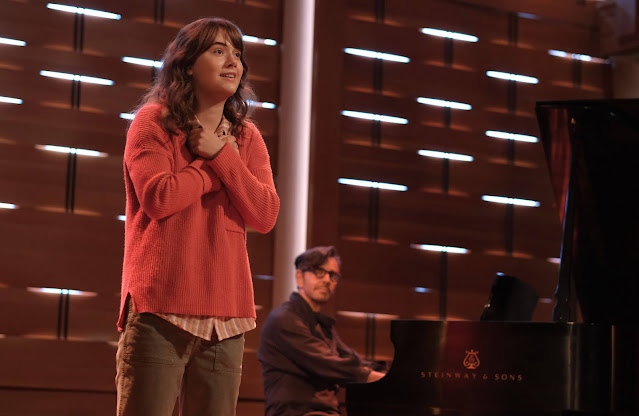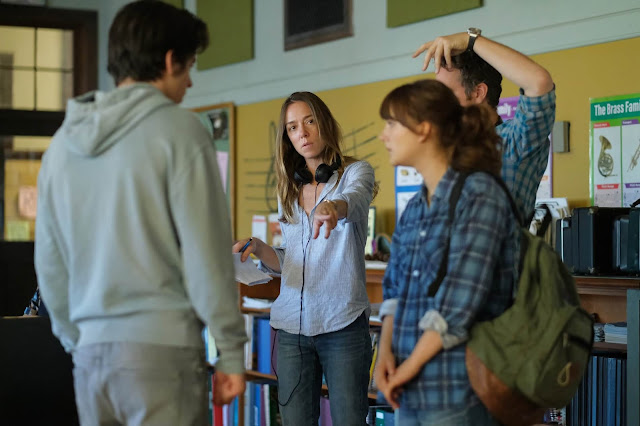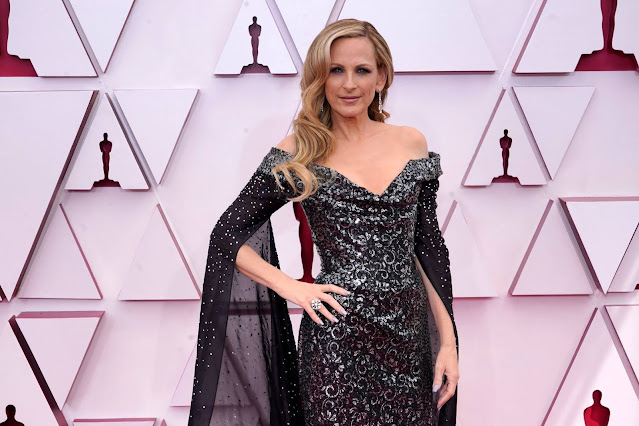CODA is a dramatic and musical comedy that swept the Sundance Film Festival 2021, where it also obtained two historical records at the festival: being the film for which they have paid a greater amount of money for its distribution and obtained all the important awards.
It is a remake of a 2015 French film, but amends some of its mistakes. The result is a film in which there is very little to criticize in terms of the representation of Deaf people and Sign Language, regardless of whether you enjoy the film or not.
On this occasion, we will dissect the film through its protagonists. If you haven't seen it yet, don't look for videos or other articles on the Internet, as the many spoilers may spoil some of its best surprises for you. Here's everything you need to know about the film, spoiler-free, after collecting information from more than 25 media sources.
The CODA Title
Those who know the Deaf community know that CODA stands for Child of Deaf Adult. This group has certain particularities that are well represented in the film, such as growing up with a bilingual identity or living special situations during childhood because their family is Deaf.
However, not many people know that coda also has a musical meaning: it can be a musical section at the end of a movement or a sign in musical notation to signal a repetition (more information here). So the title of the film plays with this double meaning which, moreover, seem to collide like the plot of the film: music and silence, a hearing girl and her Deaf family.
As a CODA (Child of Deaf Adults) Ruby is the only hearing person in her deaf family. When the family's fishing business is threatened, Ruby is torn between pursuing her love of music and her fear of abandoning her parents (source: IMDB)
Remake of The Bélier Family
CODA is an American adaptation of the French film The Bélier Family, released in 2015 to great acclaim: over 7 million viewers in France alone and $72 million grossed in theaters worldwide (see article here). CODA's story is basically the same as the French original but changing the setting - a French farming community for a fishing family - and correcting some of its flaws.
For this, CODA's director and screenwriter, Sian Heder, had the collaboration of two Deaf creatives: Anne Tomasetti and Alexandria Wailes. Alexandria in particular has extensive experience in film, having participated as an actress in many short films and television series, as well as having previously worked as a Sign Language consultant on the film A Quiet Place and the television series Quantico. The professional role of Sign Language consultant is very common in Hollywood film productions and is usually performed by Deaf native Sign Language speakers who support the creative process of performances involving Deaf or Sign Language characters.
There are many improvements that can be perceived in the film but, in order not to make spoilers, we can say that one of the improved aspects in the American version is that the whole family is played by Deaf actors and actresses in real life, while in the French original only the brother was actually Deaf. So this is translated on screen by a greater authenticity in the Sign Language and in the body interpretation of the Deaf characters, a success that film productions around the world should take note of.
By all reports, CODA capitalizes on La Famille Bélier’s (formulaic) strengths and has addressed some of the original film’s weaknesses, not least of all in better developing the roles of the parents, hiring deaf actors to play them (including Matlin as the mother), and generally treating deafness with greater sensitivity (Megan Feeney, Crooked Marquee)
Anne Tomasetti and Alexandria Wailes helped Sian Heder, director and screenwriter, to adapt the script into American Sign Language and Sian said that "I certainly wouldn't have been able to make this film without the collaborators that I had". In the following video you can see them explaining their work (American Sign Language and English subtitles):
The authenticity of CODA's Sign Language interpreting is such that they even include the specific variety of the local Sign Language that is used as the setting in the film, Gloucester in Massachusetts, a fishing village in the northwestern United States. To this end, consultant Anne Tomasetti asked the Deaf community via social media for the most appropriate sign for the specific vocabulary, for example, to express crab or lobster in the local American Sign Language.

|
| Gloucester, Massachusetts, northwestern United States, the setting for the film CODA (photo: CC BY 2.0 by Paul Keleher, viaWikimedia) |
Many Awards and an Oscar Nomination
The film swept the Sundance Film Festival 2021, one of the world's most prestigious independent film festivals, winning the Grand Jury Prize, the Audience Award, the Directing Award and the Best Casting Award, making it the most awarded film in the festival's history.
So far, CODA has received 87 nominations and 27 awards at festivals around the world, including a nomination for Best Motion Picture Drama at the Golden Globes and is rumored to be nominated for Best Original Song at the 2022 Oscars. Critics and audiences have been unanimous in their assessment of the film: it has scored 8.1 points on IMDB and 96% on Rotten Tomatoes.
Such was CODA's success at the Sundance Film Festival that Apple acquired the rights to reproduce the film for a record $25 million, the highest amount ever paid for a film in the history of this festival. Netflix and Amazon also bid for the film.

|
| CODA scene featuring the song Beyond The Shore, which could be nominated for an Oscar for Best Original Song in 2022 (photo: © Apple TV+). |
Emilia Jones and Sign Language
British actress Emilia Jones has been known in recent years for being one of the main characters in the Netflix television series Locke & Key.
The actress learned Sign Language from Anselmo DeSousa, a Canadian Deaf actor who also works as a Sign Language teacher and consultant.Why Canadian? Because when Emilia Jones was preparing for her role in CODA, she was in Canada filming the second season of the series Locke & Key.
Emilia learned Sign Language for nine months. She also had the support of Sign Language consultant Alexandria Wailes, who had previously worked on the script with director Sian Heder. To this end, Wailes discussed with Heder the lines of Jones' role, seeking the best match between English and American Sign Language, and noted the decisions using glosses, a system of written Sign Language notation. Wailes then recorded herself on video and sent the videos to Emilia Jones in Canada so she could practice and work on her lines of dialogue with Anselmo DeSosa.
I found the ASL on set really taught me and all the crew a better way to communicate. ASL really taught me the true meaning of communication
Eventually, Emilia learned enough Sign Language to maintain some improvised communication with her Deaf co-stars and has stated her intention to continue practicing it after the film.

|
| CODA filming moment (photo: © Apple TV+) |
The Director Also Learned
Director and screenwriter Sian Heder also learned Sign Language from Deaf actress Hillary Baack. Although during filming she had a Sign Language interpreter to communicate with the Deaf actors and actresses, she soon decided to communicate directly in Sign Language, as she explains:
I didn’t realize, going in, how much the actor would be looking at the interpreter and not me. So I agreed with my actors that I would sign with them directly and we’d have the interpreter there to jump in. I was like, ‘You’re going to have to put up with a lot of ridiculous signing, and feel free to make fun of me when I get it wrong. We’ll always have someone there to clarify and make sure we’re all on the same page.’ But it was so great, because I think we did forge really strong relationships and developed such important communication about these characters that we wouldn’t have been able to find through the interpreters
In the following video you can see director Sian Heder signing some sentences at the beginning (in American Sign Language):
Marlee Matlin: The Star
The only Deaf winner of the Best Actress award in Oscar history, Marlee Matlin was the film studio's first choice to play the role of Emilia Jones' mother. Little more can be added here from an actress of her caliber who has already appeared in more than 60 films and TV episodes, and has her own star of fame in Hollywood (in fact, it was the first article published in Exceptional, in 2018, here).
She was the one who pushed the hardest for all the Deaf characters in the film to be played by real-life Deaf people and even went so far as to say, when the studio was considering having her husband's role in the film played by a hearing actor, "If you do, I'm just out, that's it."
Marlee emphasizes, once again, how enriching it is for the film world to tell stories about Deaf people:
No one said that Hollywood is an easy place to get work, whether you're deaf or not. But it's doable. We have so many stories to tell, so many stories to share that are beautiful
After 35 years of professional career, Marlee Matlin is such a recognized star in Hollywood that she has been invited to present one of the awards at the 2021 Oscars. Still, after such an extensive curriculum, for Marlee Matlin, working on a film sharing the lead role with other Deaf colleagues, with a director so involved and respectful of the Deaf community, and telling a story like CODA, was one of her best professional experiences and has probably been her favorite role to date since filming Children of a Lesser God, for which she was awarded the Oscar.

|
| Marlee Matlin on arrival at the 2021 Oscars gala, where she presented one of the awards (photo: Tanjug/AP) |
Outstanding Performance by Troy Kotsur
Troy Kotsur is also a veteran actor, Deaf in real life, who plays Marlee Matlin's husband and Emilia Jones' father in the film. His performance has been widely applauded by critics and audiences alike, meriting the awards he has received for his work. In fact, Troy is one of the favorites to be nominated for the 2022 Oscar in the Best Supporting Actor category, according to some predictions (e.g., at GoldDerby, Variety and ScreenRant). No doubt, he is a strong candidate considering that he has already won the Hollywood Critics Association Award, the prestigious Gotham Award and was nominated for the Golden Globes, considered the prelude to the Oscars.
Troy's improvisational skills in Sign Language stand out; some of the funniest scenes of his character in CODA bear his personal stamp. But, obviously, he also prepared for his role as a hardened fisherman at sea: he experimented as a fisherman, his attire and work for two weeks before filming to get used to the fishing equipment, in addition to interacting with local fishermen in the area.

|
| Troy Kotsur in a scene from the movie CODA (photo: © Apple TV+). |
Troy studied theater, film and television at Gallaudet University, starting to work shortly after finishing his degree. Over the course of 20 years, he has participated in several films, short films and television series, most recently in episode 5 of the television series The Mandalorian (season 1, 2019), in which he plays a character to which he also contributed by developing a new fictional Sign Language in line with the linguistic diversity of the Star Wars universe. But his greatest acting background is in theater, having worked on the multi-award-winning Broadway plays Big River and Spring Awakening.
CODA director and screenwriter Sian Heder said of Troy:
Troy's an incredible improvisor and he's really funny. He's just a handsome, big guy who's got a great face on screen and I think he's got incredible charisma and presence. His ASL (American Sign Language) is really creative and really beautiful
In the following video, we can enjoy three of Troy's favorite movie and theater monologues performed by himself in American Sign Language: one from American Buffalo, one from Sunset Boulevard, and the last one from Cyrano de Bergerac.
Daniel Durant's Rise
Although Daniel Durant has extensive theatrical experience and has participated in some television series, such as Switched at Birth and an episode of the Netflix series You, CODA was his first feature film. Like the rest of the cast, Daniel was excited to participate in the film and even confesses that he got excited after reading the script.
Like Troy Kotsur, Daniel also studied acting at Gallaudet University, after which he began working in theater. Now 32 years old at the time of this article's publication, Daniel has already won several awards for his acting career, including the Theater Award for Outstanding 2016 Broadway Debut Performance.
There’s no difference between having a deaf actor and a non deaf actor I think it’s just the language that’s the only difference (Daniel Durant, Fox21)
Some media and critics predict a brilliant acting career for Daniel Durant, since, in addition to recognizing his talent as an actor, they consider that he has a very attractive physical presence for the big screen.
We end with a brief interview with the director and stars of the film (in American Sign Language):
Sources:
- Afonso, B. (2021, February 1). CODA, la película que Apple le ha robado a Amazon y que va a ser un exitazo. In GQ. Retrieved from https://www.revistagq.com/noticias/articulo/coda-pelicula-apple-tv
- Alexander, B. (w/d). 'We are not costumes': Why Marlee Matlin put her foot down, insisting 'CODA' cast deaf actors. In USA Today. Retrieved from https://eu.usatoday.com/story/entertainment/movies/2021/08/12/coda-marlee-matlin-fought-star-deaf-actors-lauded-film/5563441001/
- Canfield, D. (2021, December 15). How CODA’s Groundbreaking, Powerhouse Cast Came Together. In Vanity Fair. Retrieved from https://www.vanityfair.com/hollywood/2021/12/awards-insider-coda-ensemble-assembled
- Carey M. (2021, December 1). The Partnership: Siân Heder And Marlee Matlin On The Importance Of Casting Deaf Talent for ‘CODA’: “For So Long We’ve Been Overlooked”. In Deadline. Retrieved from https://deadline.com/2021/12/sian-heder-marlee-matlin-coda-apple-tv-plus-partnership-1234882294/
- Carlin, S. (2021, August 16). AppleTV+’s New Movie CODA Is A Very Necessary Remake. In Refinery 29. Retrieved from https://www.refinery29.com/en-gb/2021/08/10630690/is-coda-movie-a-true-story-remake-original
- Del Barco, M. (2021, August 8). How Troy Kotsur of 'CODA' broke barriers as a deaf actor, on stage and on screen. In NPR. Retrieved from https://www.npr.org/2021/08/08/1025124051/troy-kotsur-coda-deaf-actor-mandalorian-criminal-minds
- Feeney, M. (2021, August 11). La Famille Bélier: The French Dramedy Behind CODA. In Crooked Marquee. Retrieved from https://crookedmarquee.com/la-famille-belier-the-french-dramedy-behind-coda/
- Gray, T. (2021, noviembre, 12). Marlee Matlin Says Her Film ‘CODA’ ‘Has Ignited a Fire’ About Authentic Casting. In Variety. Retrieved from https://variety.com/2021/awards/news/marlee-matlin-coda-authentic-casting-deaf-1235107681/
- Grobar, M. (2021, January 28). ‘CODA’ Stars Marlee Matlin, Troy Kotsur & Daniel Durant Talk Authentic Portrait Of Deaf Culture & The Need To Represent It With A Broader Range Of Stories — Sundance Studio. In Deadline. Retrieved from https://deadline.com/video/coda-stars-marlee-matlin-troy-kotsur-daniel-durant-sian-heder-sundance-video-interview-news/
- Jacobsen, K. (2021, December 20). Troy Kotsur (‘CODA’) on his sudden success: ‘I never thought that would happen to me’. In GoldDerby. Retrieved from https://www.goldderby.com/feature/troy-kotsur-coda-video-interview-1204658216/
- Jacobsen, K. (2021, December 8). Daniel Durant on ‘CODA’: ‘I cried a little bit when I finished the script’. In GoldDerby. Retrieved from https://www.goldderby.com/feature/daniel-durant-coda-apple-video-interview-1204624111/
- Kaufman, A. (2021, August 13). The Deaf still face ‘outright discrimination’ in Hollywood. How ‘CODA’ broke the mold. In Los Angeles Times. Retrieved from https://www.latimes.com/entertainment-arts/movies/story/2021-08-13/coda-film-deaf-sign-language-hollywood
- Kennedy, C. (2021, August 29). CODA, a US remake of The Belier Family, is charming. In The Canberra Times. Retrieved from https://www.canberratimes.com.au/story/7403146/character-based-comedy-charms/
- Kerr, E. (2021, August 13). Duluth actor gets his biggest stage yet in the new movie 'CODA'. In MPR News. Retrieved from https://www.mprnews.org/story/2021/08/13/duluth-actor-gets-his-biggest-stage-yet-in-new-movie-coda
- McDougall, A. (2021, August 7). Marlee Matlin on the game-changing deaf representation of ‘CODA’. In Vogue. Retrieved from https://vogue.sg/marlee-matlin-coda-deaf-representation/
- Nović, S. (2021, August 15). Marlee Matlin Knows How To Make Change. In Bustle. Retrieved from https://www.bustle.com/entertainment/marlee-matlin-coda-the-west-wing-deaf-advocacy-quotes
- Raga, P. (2021, August 11). Here's How Actress Emilia Jones Prepared to Play a 'CODA'. En Distractify. Retrieved from https://www.distractify.com/p/is-emilia-jones-fluent-in-asl
- Saldaña, J. (2021, January 29). Así es CODA: la película que Eugenio Derbez presentó en Sundance. In Quién. Retrieved from https://www.quien.com/cultura/2021/01/29/coda-pelicula-eugenio-derbez-sundance
- Smart, J. (2021, July 14). Marlee Matlin to Hollywood: Disability Is ‘Not a Box to Be Checked Off’. In Backstage. Retrieved from https://www.backstage.com/magazine/article/marlee-matlin-coda-73648/
- Solsman, J.E. (2021, August 18). Apple's movie CODA lets you into an inner world of sign language. In cNet. Retrieved from https://www.cnet.com/tech/services-and-software/apples-movie-coda-lets-you-into-an-inner-world-of-sign-language-asl-artform/
- Volpie, A. (2021, November 17). Learning ASL Completely Changed Acting for ‘CODA’ Star Emilia Jones. In Backstage. Retrieved from https://www.backstage.com/magazine/article/emilia-jones-coda-asl-acting-advice-74282/
- Welk, B. (2021, December 15). Why ‘CODA’ Recital Scene Was the Perfect Moment to See (and Hear) the World From Deaf Characters’ Perspective. In The Wrap. Retrieved from https://www.thewrap.com/coda-marlee-matlin-interview-recital-scene/
- Zacharek, S. (2021, August 11). Marlee Matlin Will Never Stop Trying to Kick the Door Open. In Time. Retrieved from https://time.com/6085873/marlee-matlin-coda/













